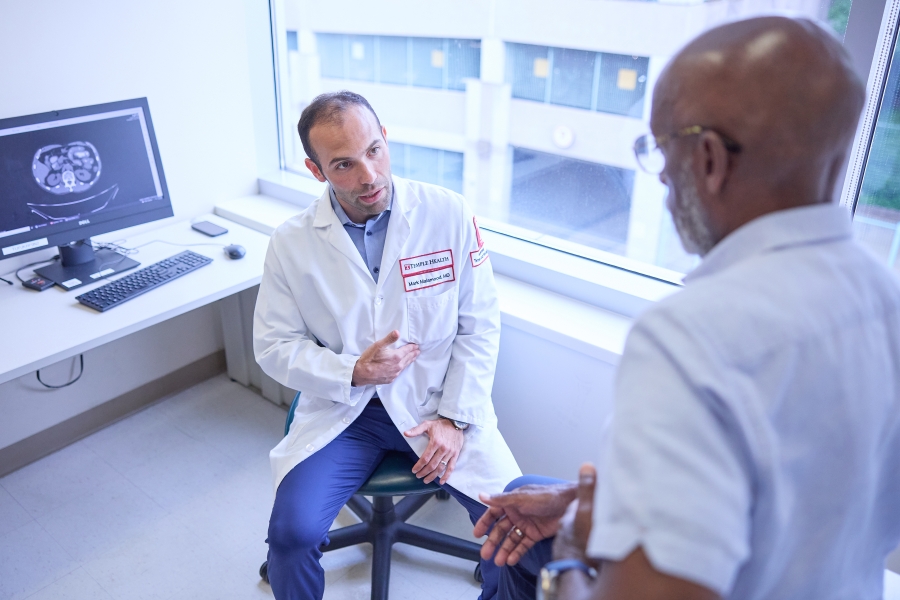Colonoscopy — it’s the medical test that people both dread and joke about. But if you’re age 50 or older, it’s the test that could save your life.
Here’s the Facts
Colonoscopy lets a doctor look inside your large intestine from the rectum through the colon to the lower end of the small intestine. The procedure checks a variety of gastrointestinal symptoms, including unexplained changes in bowel habits or the cause of bleeding from the rectum. It’s also used to look for early signs of cancer in the colon and rectum.
Polyps — growths of tissue in the colon — can be removed to prevent them from developing into colon cancer. Polyps and early cancer can have no symptoms. That’s why it’s important to have a colonoscopy to determine if a polyp or cancer is growing in the colon.
Preparing for Your Colonoscopy
Your colon must be completely empty for the colonoscopy to be thorough and safe. To prepare for the procedure, you’ll follow a liquid diet for one day beforehand. A liquid diet includes:
- Broth
- JELL-O
- Strained fruit juice
- Water
- Plain coffee or tea
- Soda
You’ll also drink a special solution which flushes the colon clean, and you may need to take laxatives.
What to Expect During the Procedure
A colonoscopy is an outpatient procedure that takes approximately 30 minutes to perform. During the procedure, you will lie on your side on an examination table. For your comfort, you’ll receive a sedative to help you relax during the procedure.
During a colonoscopy, the doctor inserts a flexible tube called a colonoscope into your rectum and guides it throughout the colon. The colonoscope produces an image like a television picture of the inside of your colon, so the doctor can examine it.
If anything unusual is in your colon, like a polyp or inflamed tissue, the doctor can perform a biopsy. A biopsy involves removing a piece of abnormal tissue using instruments passed through the colonoscope. The tissue is then sent to a lab for testing. A polyp can also be removed through the colonoscope during the exam to prevent it from growing into colon cancer.
After the Procedure
Following the procedure, it’s normal to experience mild cramping or abdominal pressure. This usually subsides in a short amount of time.
You will need to remain at the doctor’s office for 1 to 2 hours until the sedative wears off. Because of this, you must arrange for someone to take you home afterward. You can resume normal activities the next day.
Bleeding and puncture of the colon are possible complications of colonoscopy, but such complications are very uncommon.
Results and Follow-Up Appointment
After the exam, the doctor will explain the findings to you and your family. You may need a follow-up office appointment based on the findings. If the doctor performed a biopsy or removed a polyp, the results are usually available within 3 to 7 days.
Debunking the Myths
Myth #1: Colonoscopy is unpleasant and uncomfortable.
FALSE. For your comfort, you’re sedated during the procedure. The procedure itself takes only 30 minutes and you can resume normal activities the next day.
Myth #2: Colonoscopy is difficult to prepare for.
FALSE. Preparing for a colonoscopy involves following a liquid diet for one day before the procedure. Preparation also involves cleaning the colon with the help of prescription and over-the-counter medications. Typically these are liquid drinks that you must consume a day or two before the procedure. These special solutions flush the colon so that the doctor will have the best possible view.
Myth #3: Colonoscopy is only a screening technique.
FALSE. Colonoscopy is an all-in-one tool. It can find and remove polyps to prevent them from growing into cancer. If your colonoscopy reveals a polyp, the doctor will remove it during the procedure. Colonoscopy can also find early cancer, which improves the chance of being cured.
Ready to Schedule Your Colonoscopy?
You shouldn’t wait for abdominal pain or bleeding to have a colonoscopy. Schedule a colon cancer screening with a Temple gastroenterologist by filling out the Schedule Appointment form or by calling 800-TEMPLE-MED (800-836-7536).
